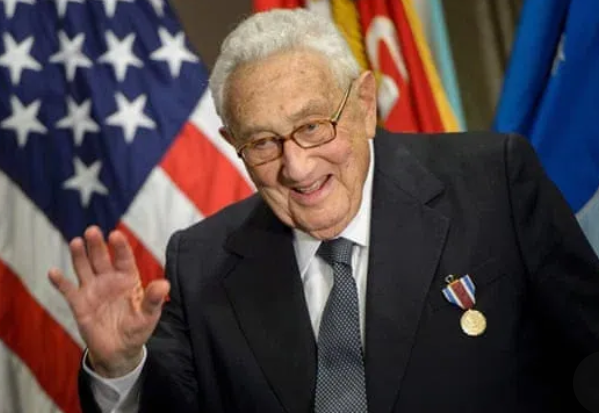Former secretary of state under Richard Nixon who became one of the most prominent and controversial figures of US foreign policy in the 20th century, Henry Kissinger has died at the age 100.
His consulting firm Kissinger Associates announced his death in a statement on Wednesday evening, but did not disclose a cause.
The celebrity diplomat has advised a dozen presidents over his long career, including Joe Biden, and won a shared Nobel prize for negotiating the end to the Vietnam war.
But his legacy was also defined by his contempt for human rights and efforts to protect US corporate interests at all costs, with opponents across the world casting him as a war criminal. He supported Indonesia’s military dictator in the invasion of East Timor, backed the invasion of Angola by the apartheid regime in South Africa and worked with the CIA to overthrow the democratically-elected president of Chile. He also authorized wiretaps of reporters and his own staff.
Kissinger was a Harvard academic before becoming national security adviser when Nixon won the White House in 1968. Working closely with the president, he was influential in momentous decisions regarding the Vietnam war including the secret bombing of Cambodia in 1969 and 1970. That was part of what Nixon called the “madman theory”, an attempt to make North Vietnam believe the US president would do absolutely anything to end the war.
He survived Nixon’s downfall in the Watergate scandal and served Gerald Ford, leaving government after Jimmy Carter’s election win in 1976. Kissinger’s policy towards the Soviet Union was not confrontational enough for the Reagan administration, precluding any thought of a 1980s comeback.
On the political and intellectual right and left, Kissinger’s legacy differs.
On the right, he is seen as a brilliant statesman, a master diplomat, an exponent of power politics deployed to the benefit of America, the country to which his family fled on leaving Germany in 1938.
On the left, hostility burns over his record on Chile, where the CIA instigated the overthrow of Salvatore Allende; on Pakistan, where he and Nixon turned a blind eye to the slaughter of hundreds of thousands; on the Middle East; on Cyprus; on East Timor and more.
Tributes for Kissinger poured in from prominent US officials after the news of his death. George W Bush said the US “lost one of the most dependable and distinctive voices on foreign affairs”, while Michael Bloomberg, the former New York City mayor, said Kissinger was “endlessly generous with the wisdom gained over the course of an extraordinary life”. Some on social media celebrated his death, referencing the victims of his bombing campaigns.
A giant of the Republican party, Kissinger remained influential until the end of his life, in large part thanks to his founding in 1982 of his geopolitical consulting firm based in New York City, and the authorship of several books on international affairs.
UKGuardian



